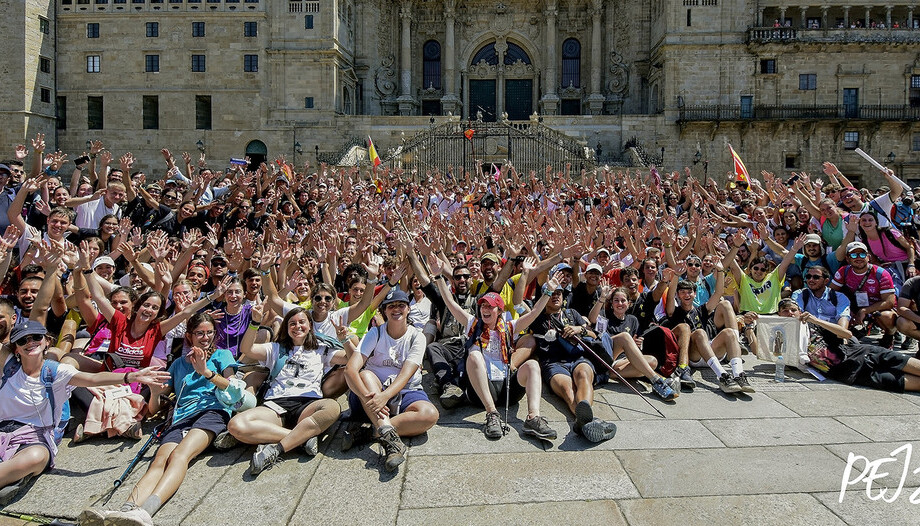A visit by Pope Francis to Santiago de Compostela, against the backdrop of those made by his predecessors; his promotion of the values of the Camino de Santiago as the culture of encounter; the Christian roots of Europe and the values of fraternity, solidarity and peace that the Camino promotes, which are key in the face of wars, are topics that the philosopher and economist Marta Pedrajas, director of the Chair of European Studies of the Way of Saint James of the Paul VI Foundation and the archbishopric of Santiago de Compostela.
At the end of last year, the Archbishop of Santiago, Francisco José Prieto, stated in the constitution of the ChairTo say the road to Santiago is to discover the roots of what we are so that we are also very clear about the roads we have to travel. The road to Santiago reminds Europe of who it is and where it comes from and what it has to continue to mean at this moment. This road continues to be a horizon of hope and meaning, for believers and non-believers alike".
Omnes has been giving informative attention to the Camino de Santiago since its launch. In July 2021, for example, it published in the July-August summer issue a Special of 48 pages entitled On the way to SantiagoThe book, on the occasion of the Compostela Holy Year, with illustrious signatures, numerous photographs and practical information for pilgrims.
In this interview, director Marta Pedrajas points out that "the Camino is more than a route; it is a journey of encounter with oneself, with others, with beauty, with the divine. My personal experience is that they should let themselves be carried away, let themselves be surprised and be willing to let themselves be transformed by the experience".
In March of this year, the Chair of European Studies of the Way of St. James of the Paul VI Foundation and the Archbishopric of Santiago de Compostela was launched. Can you point out some of its main objectives?
- The objectives of the Chair are to revitalize the Christian roots of Europe, taking as a model the Way of St. James, and to create and strengthen the culture of encounter as proposed by Pope Francis in his magisterium, as in The Joy of the Gospel, Fratelli Tuttigoing to the last, to the peripheries, promoting solidarity and human rights.
On this feast of the Apostle St. James, it seems appropriate to recall some ideas of the Archbishop of Santiago, Francisco José Prieto, regarding the pilgrimage.
- Bishop Francisco José Prieto emphasized in his talk that the Way of St. James is a transforming and spiritual experience. The pilgrimage is not only a physical journey, he invited to be open to a process of inner change, to launch into the adventure with an open heart, since the journey offers a unique opportunity for reflection, personal growth, the encounter with beauty and, therefore, with the divine.
Both the general director of the Paul VI Foundation, Jesus AvezuelaYou, as well as yourself, have referred to the importance of this route for the structuring of Europe, and how the values it embodies can help to face current challenges such as the search for peace in the face of the wars in Ukraine and Russia, or in Palestine and Israel. Is that correct? Any comments?
- That is correct. Both Jesús Avezuela and myself have highlighted the importance of the Way of St. James as a symbol of European unity and identity. And the values of fraternity, solidarity, encounter and peace that the Camino promotes can serve as a guide to face contemporary challenges. These values are essential to build a more peaceful and cohesive, fairer and more united future in Europe and in the world.
St. John Paul II and Benedict XVI visited Santiago de Compostela on historic occasions. Will Pope Francis be able to visit Santiago?
- The visit of Pope Francis to Santiago de Compostela would be very significant, given the impact of the visits of his predecessors, St. John Paul II and Benedict XVI. But whether it is possible or not, Pope Francis has always shown his interest in promoting the values of the Way of St. James as the culture of the Encounter, and his commitment to the spiritual and cultural revitalization of Europe.
A word of encouragement to this year's walkers, and to those who are hesitating to undertake the path. Do you have personal experience? A piece of advice?
To this year's walkers and to those who are considering undertaking the Camino de Santiago, I would say to them that they should be encouraged to live this unique experience with an open heart. The Camino is more than a route; it is a journey of encounter with oneself, with others, with beauty, with the divine. My personal experience, let yourself be carried away, let yourself be surprised and be willing to let yourself be transformed by the experience.








